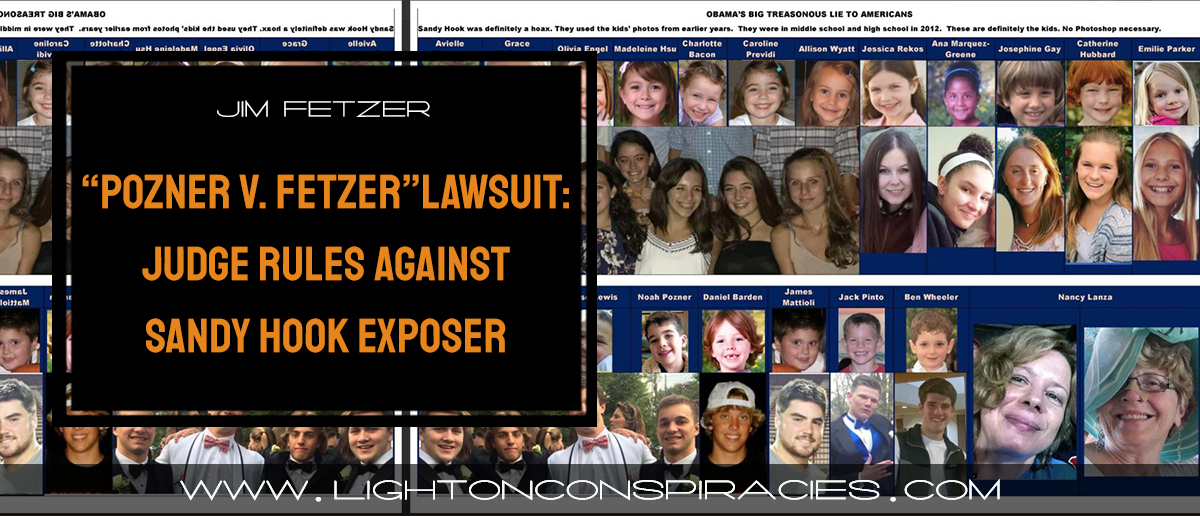June 18, 2019 James Fetzerblog
Jim Fetzer
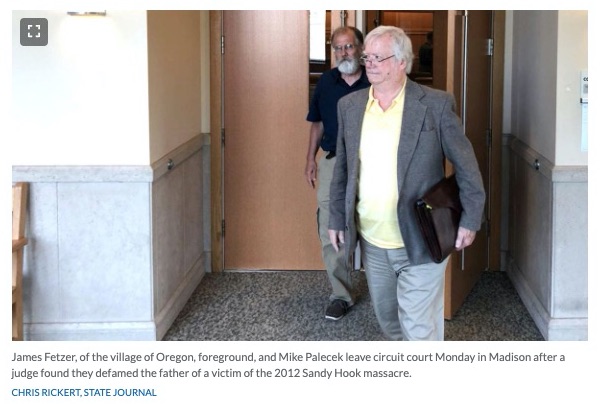
As the Wisconsin State Journal reports, “A Dane County judge on Monday found that a longtime conspiracy theorist living in the village of Oregon, along with his co-defendant, defamed [Leonard Pozner] the father of a victim of the Sandy Hook massacre and allowed a trial for damages against the men to move ahead” (“Judge Rules Against Sandy Hook Denier” (17 June 2019).
The story correctly reports, Pozner’s primary attorney, Jacob Zimmerman, also submitted an official copy of the death certificate, with the required embossed seal, to the court and argued that Fetzer and Palecek had not asked for the original but had instead relied on “copies of copies of copies that they found somewhere out on the internet.”
But those were not the copy published in the book, which I had described as a fabrication. And, because is is an uncertified copy, my characterization was correct. In Connecticut, not even parents are allowed to possess an uncertified copy of a death certificate. The copies he introduced were irrelevant and immaterial to the case.
I did indeed acknowledge that the original reasons he called the death certificate a fake were mistaken, as the story reports, but claimed other deficiencies with the document proved it was fabricated. He said Pozner’s lawsuit was an attempt to silence him and other Sandy Hook “truthers.”
“This entire case is as fabricated as the death certificate,” he said. “They want more grist for their mill.” The Judge, John Remington, said he found Pozner’s explanations for the alleged deficiencies on the death certificate “legitimate and plausible and persuasive.” But the absence of certification is decisive.
The Judge was wrong when he reasoned that, I=if there are differences among official copies of a document, “that does not alone indicate that any of them are false,” he said. “It only demonstrates a difference.” Some differences are more important than others. This difference was the crucial issue in this case.
As the article explains, neither Fetzer nor Palecek was represented by an attorney. “Nobody wants to touch” their case, Fetzer said. It also reports that I have also advanced conspiracy theories about the Sept. 11 attacks, John F. Kennedy’s assassination, the shootings in Parkland, Florida, and other events.
Before I was served with the Complaint on 29 November 2018, I had never seen the death certificate attached to the Complaint. So now I confront a possible $1,000,000 liability for a death certificate that I had never before seen or commented upon, which was not published in the book.
Here is most of what I said when I had the opportunity to speak. I added more about Sandy Hook as I spoke, which will be included in the transcript, portions of which I shall also share. The law is being used to punish those who are exposing falsehoods and revealing truths about Sandy Hook. The public deserves better.
ORAL ARGUMENT BRIEFING NOTES
Defendant James Fetzer
17 June 2019
The death certificate for which I am being sued is the one published in the book,Nobody Died at Sandy Hook: It was a FEMA Drill to Promote Gun Control, which has appeared as Chapter 11 co-authored with Kelley Watt in both first editions (2015) and second (2016). It is an expanded and revised version of an article that I originally published on Veterans Today(6 August2014), which included the death certificate for my characterization of which I have been sued. Kelley said it came from “Lenny”. I published it in VT and with Mike Palecek in both editions and we made no changes to its content.
It appears that I added a border, which is not one of the things that they complain about. The circumstances of this version’s publication are not in issue. The death certificate that I received from Plaintiff via Kelley Watt is not certified by Newtown’s Registrar of Vital Statistics, Debbie Aurelia (now) Debbie Aurelia Halsted. Plaintiff has admittedto his conversations with Kelley and to having posted it on Noah’s memorial Google Plus page. So, even though I may have added a border, for which I take responsibility, the rest came from him. The file size is immaterial and varies with compression and reproduction. What matters is what is on it—and what is not, because it does not have the Town Registrar’s certification on the side, it is therefore illegal and a fabrication, precisely as I maintain.
In his latest gambit, moreover, the Plaintiff attempts to prove too much. If the border makes a difference and the death certificate is ON THAT VERY GROUND not bona fide, then the certificate that I described as a fabrication In the book is in fact a fabrication by Plaintiff’s own contention. How ironic that Plaintiff thereby admits that I am right and my statement truthful, in which case I cannot be found guilty of defamation for my true affirmation. If the death certificate published in the book were not the same as the one that “Lenny” published on a web site, then the suit filed against me and my co-defendant, Mike Palecek, on 27 November 2018, would have had an entirely different character. The Complaint does not deny this is the same document that “Lenny” provided to Kelley Watt but instead attacks me for declaring it to be a fake and a fabrication. The appropriate passages from the Complaint read:
- The second edition of “Nobody Died at Sandy Hook” accuses Plaintiff of issuing and/or possessing a forged copy of N.P.’s death certificate. In particular, page 183 of Nobody Died at Sandy Hook states: “Noah Pozner’s death certificate is a fake, which we have proven on a dozen or more grounds.” At page 232 the book states, [Mr. Pozner] sent her a death certificate, which turned out to be a fabrication.” At page 242, the boostates, “As many Sandy Hook researchers are aware, the very document Pozner circulated in 2014, with its consistent tones, fonts, and clear digital manipulation, was clearly a forgery.”
A comment from a contribution to the Sandy Hook Memoranda for POTUS, edited by Robert David Steele, has also been cited as being defamatory:
- Mr. Fetzer’s publication of this false accusation against Plaintiff was not limited to the book. He repeated that false statement on one or more blog posts, including, e.g.,https://phibetaiota.net/2018/08/james-fetzer-in-solidarity-with-alex-jones-how-we-know-sandy-hook-was-a-fema-drill-nobody-died-obama-officials-confirmed-it-was-an-anti-gun-propaganda-exercise. That blog post is dated August 5, 2018. There, Defendant Fetzer made the following false statement: “It [N.P.’s death certificate] turned outto be a fabrication, with the bottom half of a real death certificate and thetop half of a fake, with no file number and the wrong estimated time ofdeath at 11 AM, when ‘officially’ the shooting took place between 9:35-9:40 that morning.” That statement is false, both in its particular fact and in the main point, essence, or gist in the context in which it was made, because N.P.’s death certificate is not a fabrication or forgery. That context of that tatement referred specifically to Plaintiff, the previous sentence reads:“Kelley Watt had over 100 hours of conversation with ‘Lenny Pozner’, whopurports to be his father and who sent Kelley a death certificate for ‘Noah’ as proof that he had died, which we included in the book.”
Notice there is no denial that the death certificate published in the book is the same as the death certificate that the Plaintiff made available to Kelley Watt, who in turn shared it with me and I with my co-defendant, when we edited and published the first edition of the book using CreateSpace, a subsidiary of amazon.com, and placed in on sale on 22 October 2015 only to be banned on 19 November 2015 after selling nearly 500 copies.
Moreover, we are all aware that arguments have two parts: premises(or the grounds reasons or evidence one cites) and conclusions. In this case, my premises may have been mistaken or wrong—the absent file number, the differences in tone and texture, the variations in font sizes and spacing, which led me to believe that this document had been created by combining the bottom half of a real death certificate with the top half of a fake—given what I have learned in the meanwhile, do not appear to have been right. But my conclusion—that the document is a fake or a fabrication—has been borne out by subsequent research, including the forensic analysis of Larry Wickstrom, confirmed by the further review and analysis of A.P. Robertson, which leave no doubt about it. Even though my initial reasons were bad, there are abundant good reasons to arrive at the same conclusion, where my original argument had false premises but a true conclusion.
As the Complaint itself emphasizes, its foundation is the crucial claim I have made that the death certificate that Plaintiff provided to Kelley Watt is a fake, a fabrication, or a forgery. Truth is an absolute defense to defamation. This case hangs on the question of authenticity, specifically, upon the truth or falsity of my assertion that this document is not authentic as a fake, a fabrication, or a forgery. My premises or reasons for reaching that conclusion may not have been good ones, but the conclusion I reached, which is the issue upon which this case revolves, was true. And because I believed what I wrote at the time on the basis of (what I took to be) good reasons at the time, I cannot have acted with malice, which requires knowing what you are asserting is false but asserting it anyway with the intent to mislead your target audience, which I have not done. This means that the Complaint likewise has no basis in claiming that I acted with malice;
36, Defendant Fetzer acted with actual malice. In particular, Defendant Fetzer published his statements knowing that the statements were false or with reckless disregard for the truth or falsity of the statements.
On the contrary, my conclusion was reached on the basis of collaborative research with several others, including Dennis Cimino, who was the top electronics trouble-shooter for the US Navy before he left to work for Raytheon and a contributor to the first edition of the book and who suggested that portions had been photoshopped, where I had reason to take him at his word. The additional reasons reported by Bob Simms—about the fonts, the size and spacing of words in the document—were ones I confirmed by direct observation. In combination with my own observations about dark texture of (roughly) the bottom 2/3 in contrast with the top 1/3, it was my inference that the document appeared to be fabrication combining the bottom half (or 2/3) or a real death certificate with the top half (or 1/3) of a fake, which I no longer believe is true.
My reasons regarding the top half included the absence of a file number, which it turns out can occur with documents obtained from the Town Registrar, and wrong estimated time of death as 11 AM, when, as even the Report on the Sandy Hook Shooting by Danbury State’s Attorney Stephen Sedensky III states, the shooting took place between 9:30-:40 (or 9:41), which meant the estimated time of death was wildly inaccurate. Even though the Medical Examiner, Wayne Carver, II, M.D., sought to explain that away, it remains inconsistent with the official account, which was one more reason why I sincerely believed that this document is a fake, a fabrication or a forgery. Therefore, for the wrong reasons, I came to the right conclusion. Not only am I not guilty of defamation, therefore, but I did not act with malice, which is another false accusation.
Appended to the Complaint was a copy of a death certificate that I had never before laid eyes upon, which the Complaint alleged to be the same in every material respect:
- The Connecticut Department of Public Heath maintains official death records forthe State of Connecticut. The Connecticut Department of Public Heath, Vital Statistics Division, issued an official death certificate for N.P. A true and correct copy of that death certificate (sensitive information redacted) is attached hereto as Attachment A. The official death certificate attached hereto does not differ in any material respect from the one released publicly by Plaintiff.
The claim that the death certificate attached to the Complaint “does not differ in any material respect from the one released publicly by Plaintiff”, as should be apparent already, blatantly falsifies the situation we confront, because the attached certificate has both the State certification as a true copy and the certification of the Town Registrar, in the absence of which it qualifies as illegal and a fabrication. By Connecticut law, not even a parent can obtain an uncertified copy of a death certificate. It’s that blatant.
They say. “The law works in mysterious ways”, but I am baffled to this day how I could be sued for defamation regarding a document that I had never before seen, much less commented upon prior to the filing of this suit. Moreover, the copy attached was so poor that it was virtually illegible and legally useless, as I explained to Mr. Zimmerman when he called me about the suit. I asked him if he knew anything about Sandy Hook or had any idea what he was getting into, adding that the copy attached was so poor as to be unreadable and legally useless. He replied that, if I wanted a better copy, I could contact the State of Connecticut to obtain one for a $20 fee. I thought that was rather strange: to provide the Defendant with an illegible copy of a document on which the case was said to be based. While I did not initially attempt to obtain a copy, eventually co-defendant, Dave Gahary, and I both obtained copies of the death certificate for “Noah Pozner”. To my surprise, they were not the same. Mine had the same hand-written file number as on the copy attached to the complaint but no redaction for the burial location and the SSN box was empty rather than redacted. Dave’s had a partial, printed file number that does not correspond with the others. We therefore have four different versions thereof:
Exhibit A: The copy published in the VT article (2014), in the first and second editions of Nobody Died at Sandy Hook(2015 and 2016) and in the Sandy Hook Memoranda edited by Robert David Steele (2018) also cited in the Complaint, all of which have no file number but with redactions for the location of burial of the decedent and of his SSN. And it even seems to have a fake seal at the bottom left, where no seal should appear.
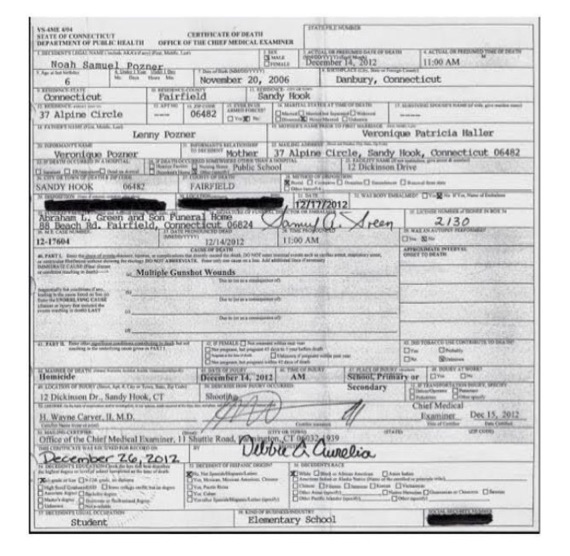
Exhibit B: Attached to the Complaint, has a handwritten file number, “2012-07-078033”. It has changes to the last residence of the deceased (from “37 Alpine Drive” to “3 Kale Davis Road”) made at the request of the father, identified as “Leonard Pozner”, and with redaction to the location of the burial plot but none to his SSN, where the box is empty.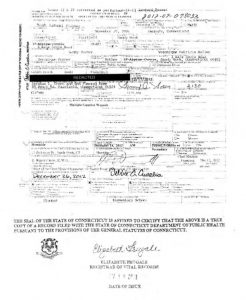
Since the box for the SSN is empty on the attached complaint, I have been puzzled that the copy published by Plaintiff was redacted as though there had been a present SSN. But notice as I have been emphasizing, the attached copy, Exhibit B, has two forms of certification, while the Kelley copy, Exhibit A, has none. What could be more material?
Exhibit C: Obtained by Dave Gahary from the Town Registrar, which has the changes made by the father (the same as Exhibit B) but has no redaction for either burial plot or SSN, where the box is empty. Its most striking difference is a file number that is printed and partial, including only the last four digits, the first obscure but the remainder “243”.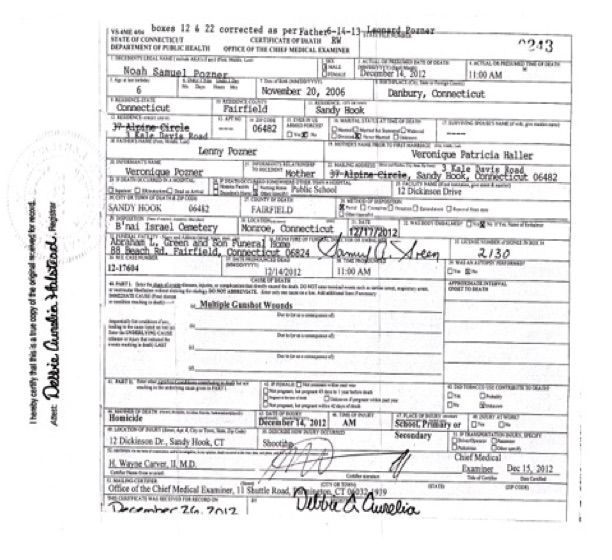
Exhibit D: Obtained by me from the State of Connecticut, it has the handwritten file number, “2012-07-078033”, but in other respects appears to be the same as Exhibit C. Notice that, although the location of the authentication of Debbie Aurelia on Exhibit B and Exhibit D both appear at the upper left (close in) to the border of the form, that onExhibit C appears at the middle (further out), which indicates more than one version.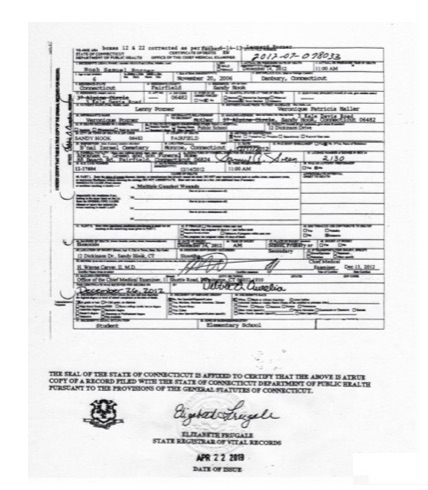
In addition to Exhibit D, I obtained four other death certificates from the state, including for purported Sandy Hook assailant, Adam Lanza; his mother, Nancy Lanza; another of the alleged victims, Avielle Richman; and for my dear friend, William Brandon Shanley, who died (apparently of natural causes) on 6 November 2017. What is most striking in relation to the disputed death certificates is that ALL OF THEM HAVE PRINTED FILE NUMBERS. None of them has handwritten. They were all on the same form (VS4-ME)except for Shanley, which, as Wayne Carver, M.D., explained to me during questioning on the occasion of his deposition in Connecticut on 21 May 2019. When I showed him Exhibit C above (obtained by Dave Gahary from the Town of Newtown), he could not explain its partial, printed file number: “Well, first of all, this was—I have no idea what it is” (Deposition Transcript, p. 81, lines 7-8) from the State Medical Examiner.
Several significant points emerge from comparing these various versions, not least of which is that, when Plaintiff provided Kelley Watt with a copy of Exhibit A in 2014, he had already made revisions to it in 2013 and knew it was not the currently available version. Notice Exhibit B, attached to the Complaint, had been corrected by “LeonardPozner” on 6-14-13. That raises the question of why the Plaintiff published on his son’s memorial page a version of his death certificate that he knew was no longer correct. It smacks of baiting Sandy Hook skeptics into focusing on a version that he could subsequently effortlessly claim to be wrong, which he knew of his own personalknowledge—because he himself had changed it!
Another anomaly with Exhibit B, which was attached to the Complaint, is that the father changed the address of the decedent. That struck me as at least faintly absurd because no one changes their last residence after they are dead! During his video deposition, I asked the Plaintiff why had had made this change, to which he replied that “Noah” had only resided at that address with his mother for a brief period of time and he wanted his death certificate to reflect the location where he had longer resided, which I regard ashighly implausible. A more reasonable explanation for this change has come from the forensic document examiner, A.P. Robertson, who suggests this may have been an effort by Plaintiff to ensure that donations from the public would flow to him at 3 Kale Davis Road rather than to his ex-wife at 37 Alpine Drive, which, if true, would explain it.
Indeed, there are at least two other anomalies—one about the death certificate, the other about the complaint—that have struck me as disturbing. On the death certificate, where it asks for first, middle and last name of the informant, only the nickname, “LennyPozner”. Even more anomalous—and, to me, extremely peculiar—is that the decedent,who is supposed to be the man’s beloved son, is only referred to by his initials, “N.P.” As a father myself, I cannot imagine in my wildest dreams having lost a child and then feeling compelled to bring a lawsuit to protect his sanctity and then only referring to him by his initials. All of these oddities are more readily explicable on the hypothesis that “Noah” is a fiction made up out of photographs of his purported older step-brother, Michael Vabner, than on the hypothesis that he was real. When we consider that we may be dealing with an illusion rather than reality, where the Sandy Hook event was a FEMA mass casualty exercise involving children to promote gun control that was then presented to the public as mass murder to promote gun control, the pieces make sense.
Insofar as the Complaint was narrowly crafted to focus upon the solitary issue of the authenticity of the death certificate and my observations about it, we find the situation—now copiously documented, including the studies of two document examiners to be as follows with respect to the charges thereby made:
COUNT ONE DEFAMATION (BY ALL DEFENDANTS).
- The statements excerpted from “Nobody Died at Sandy Hook” are false, both in their particular facts and in the main point, essence, or gist in the context in which they were made, because N.P.’s death certificate is not a fabrication or forgery.
- The statements excerpted from “Nobody Died at Sandy Hook” refer directly to Plaintiff by name, and the surrounding context likewise indicates that the comments implicate Plaintiff. Given the surrounding assertions, a reasonable reader would understand the statement to imply that Plaintiff knowingly possessed and distributed a fabricated death certificate.
Since truth is an absolute defense against defamation and the documents in question—not just Exhibits A and B, but Exhibits C and D as well—turn out to be fabrications, the Defendants have not committed defamation. Moreover, as A.P. Robertson has astutely observed, a reasonable person, observing the anomalies in the document published in the book, Nobody Died at Sandy Hook: It was a FEMA DrIll to Promote Gun Control (2015; 2ndedition, 2016), including the missing file number, the wrong estimated time of death, the difference in shading between the upper and lower portions, the variations in types, fonts and spacing—would have reasonably inferred that this document was notauthentic but a fabrication. And I have only recently realized that the given name of the town as “Sandy Hook” is not correct, because the death happened in Newtown, CT.
Even if I, the defendant, was mistaken about some of the reasons I concluded that the document was fake, it was a reasonable inference at the time. Now, supported by two expert document examiner reports, there are no good reasons to doubt that I was right. Exhibit A, the document he addressed, is in fact and indeed, a fabrication, as claimed. The allegedly defamatory statements are true, which means that Count One is refuted.
COUNT TWO DEFAMATION (DEFENDANT FETZER)
- The statements excerpted from Defendant Fetzer’s August 2018 blog post are false, both in their particular facts and in the main point, essence, or gist in the context in which they were made, because N.P.’s death certificate is not a fabrication or forgery. The surrounding context implies that Plaintiff knowinglydistributed a falsified death certificate.
Another oddity of the Complaint is the insinuation that Defendants alleged that Plaintiff had personally fabricated the death certificate addressed in the book (Exhibit A). But, while Defendant Fetzer did express that opinion to Plaintiff in private correspondence, he has not published that allegation, which he no longer entertains, and therefore in the absence of its publication, he cannot be liable for defamation under Count Two, either.
COUNT THREE CONSPIRACY
- With regard to the statements in “Nobody Died At Sandy Hook,” Defendants acted together, as a cabal, to accomplish their defamation. Defendants had a meeting of the minds on the object or course of action underlying their recklessly defamatory publication.
There being no defamation, there can be no conspiracy between to commit defamation.
The following has thus been established: No facts are in issue with regard to the death certificates. The one I received from Plaintiff via Kelley Watt is not certified. Plaintiff has admitted to his conversations with Kelley and to posting it on Noah’s memorial Google Plus page. Even though I added a border, the rest came from him. The size of image is immaterial and varies with its reproduction. What matters is what is on it–and what isnot. It does not have the Town Registrar’s seal on the left-hand side. In Connecticut, not even parents may possess an uncertified death certificate. That is decisive.
These are crucial points because the Plaintiff has not mentioned these problems in hisResponse to my MSJ. It is confessed–which means I am entitled to summary judgment in my favor. My statements are substantially true and, as the Wisconsin Supreme Court has ruled in Meier v. Meurer, 8 Wis.2d 24, 29, 98 N.W.2d 411 (1959): “In this state, if a statement be substantially true it cannot be the basis for a civil action for libel.” Meier, 8 Wis. 2d at 29 (citations omitted).
There are also legal problems with the death certificate having been received by the town clerk more than 5 days after the death, that a burial permit could not have been issued and more in my Motion for Summary Judgment. I have also pointed out that the death was supposed to be registered in the town in which it occurred, per the law, while the Funeral Director, Samuel Green, said that it was registered in Fairfield, which would mean the Fairfield clerk’s signature should appear on the death certificate, not Debbie’s.
We as the editors of Moon Rock Books have been doing our best to inform the public of the truth about its own history, which Plaintiff in this case has been desperately trying to suppress. The State of Wisconsin and the American people deserve better. The facts of the matter with regard to the Complaint are not in doubt. It has no merit and represents an abuse or process and a fraud upon the Court. The Court can contribute to ending this charade by rendering us the summary judgment to which we are entitled. Let it end.
ORAL ARGUMENT BRIEFING NOTES
Defendant James Fetzer
17 June 2019
The death certificate for which I am being sued is the one published in the
book, Nobody Died at Sandy Hook: It was a FEMA Drill to Promote Gun
Control, which has appeared as Chapter 11 co-authored with Kelley Watt in
both first editions (2015) and second (2016). It is an expanded and revised
version of an article that I originally published on Veterans Today (6 August
2014), which included the death certificate for my characterization of which
I have been sued. Plaintiff now claims that the death certificate I published
in the article and book is not the same as the one “Lenny” posted on a blog.
It appears that I added a border, which is not a claim in their complaint. The
circumstances of its publication are not in issue. The death certificate that I
received from Plaintiff via Kelley Watt is not certified. Plaintiff has admitted
to his conversations with Kelley and to having posted it on Noah’s memorial
Google Plus page. So even though I may have added a border, for which I
take responsibility, the rest came from him. The file size is immaterial and
varies with compression and reproduction. What matters is what is on it—
and what is not, because it does not have the Town Registrar’s certification
on the side and is therefore illegal and a fabrication, precisely as maintain.
In his latest gambit, moreover, Plaintiff attempts to prove too much. If there
border makes a difference and the death certificate is ON THAT GROUND
not bona fide, then it is a fabrication by the Plaintiff’s own contention. How
ironic that Plaintiff thereby admits that I am right and my statement truthful,
in which case I cannot be found guilty of defamation for my true affirmation.
If the death certificate published in the book were not the same as the one
that “Lenny” published on a web site, then the suit filed against me and my
co-defendant, Mike Palecek, on 27 November 2018, would have had an
entirely different character. It does not deny this is the same document that
“Lenny” provided to Kelley but instead attacks me for declaring it to be a
fake and a fabrication. The appropriate passages from the Complaint read:
17. The second edition of “Nobody Died At Sandy Hook” accuses Plaintiff
of issuing and/or possessing a forged copy of N.P.’s death certificate. In
particular, page 183 of Nobody Died At Sandy Hook states: “Noah Pozner’s
death certificate is a fake, which we have proven on a dozen or more
grounds.” At page 232 the book states, [Mr. Pozner] sent her a death
certificate, which turned out to be a fabrication.” At page 242, the book
states, “As many Sandy Hook researchers are aware, the very document
Pozner circulated in 2014, with its consistent tones, fonts, and clear digital
manipulation, was clearly a forgery.”
A comment from a contribution to the Sandy Hook Memoranda for POTUS,
edited by Robert David Steele, has also been cited as being defamatory:
18. Mr. Fetzer’s publication of this false accusation against Plaintiff was not
limited to the book. He repeated that false statement on one or more blog
posts, including, e.g., https://phibetaiota.net/2018/08/james-fetzer-in-
solidarity-with-alex-jones-how-we-know-sandy-hook-was-a-fema-drill-
nobody-died-obama-officials-confirmed-it-was-an-anti-gun-propaganda-
exercise. That blog post is dated August 5, 2018. There, Defendant Fetzer
made the following false statement: “It [N.P.’s death certificate] turned out
to be a fabrication, with the bottom half of a real death certificate and the
top half of a fake, with no file number and the wrong estimated time of
death at 11 AM, when ‘officially’ the shooting took place between 9:35-9:40
that morning.” That statement is false, both in its particular fact and in the
main point, essence, or gist in the context in which it was made, because
N.P.’s death certificate is not a fabrication or forgery. That context of that
statement referred specifically to Plaintiff, the previous sentence reads:
“Kelley Watt had over 100 hours of conversation with ‘Lenny Pozner’, who
purports to be his father and who sent Kelley a death certificate for ‘Noah’
as proof that he had died, which we included in the book.”
Notice there is no denial that the death certificate published in the book is the same as
the death certificate that the Plaintiff made available to Kelley Watt, who in turn shared it
with me and I with my co-defendant when we edited and published the first edition of
the book using CreateSpace, a subsidiary of amazon.com, and placed in on sale on 22
October 2015 only to be banned on 19 November 2015 after selling nearly 500 copies.
Moreover, we are all aware that arguments have two parts: premises (or the grounds,
reasons or evidence one cites) and conclusions. In this case, my premises may have
been mistaken or wrong—the absent file number, the differences in tone and texture,
the variations in font sizes and spacing, which led me to believe that this document had
been created by combining the bottom half of a real death certificate with the top half of
a fake—given what I have learned in the meanwhile, do not appear to have been true.
But my conclusion—that the document is a fake or a fabrication—has been borne out by
subsequent research, including the forensic analysis of Larry Wickstrom, confirmed by
the further review and analysis of A.P. Robertson, which leave no doubt about it. Even
though my initial reasons were bad, there are abundant good reasons to arrive at the
same conclusion, where my original argument had false premises but a true conclusion.
As the Complaint itself emphasizes, its foundation is the crucial claim I have made that
the death certificate Plaintiff provided to Kelley Watt is a fake, a fabrication, or a
forgery:
Truth is an absolute defense to defamation. This case hangs on the question of
authenticity, specifically, upon the truth or falsity of my assertion that this document is
not authentic as a fake, a fabrication, or a forgery. My premises or reasons for reaching
that conclusion may not have been good ones, but the conclusion I reached—which is
the issue upon which this case revolves, was true. And because I believed what I wrote
at the time on the basis of (what I took to be) good reasons at the time, I cannot have
acted with malice, which requires knowing what you are asserting is false but asserting
it anyway with the intent to mislead your target audience, which I have not done. This
means that the Complaint likewise has no basis in claiming that I acted with malice;
36, Defendant Fetzer acted with actual malice. In particular, Defendant Fetzer published
his statements knowing that the statements were false or with reckless disregard for
the truth or falsity of the statements.
On the contrary, my conclusion was reached on the basis of collaborative research with several
others, including Dennis Cimino, who was the top electronics trouble-shooter for the US Navy
before he left to work for Raytheon and a contributor to the first edition of the book and who
suggested that portions had been photoshopped, where I had reason to take him at his word.
The additional reasons reported by Bob Simms—about the fonts, the size and spacing of words
in the document—were ones I confirmed by direct observation. In combination with my own
observations about dark texture of (roughly) the bottom 2/3 in contrast with the top 1/3, it was
my inference that the document appeared to be fabrication combining the bottom half (or 2/3)
or a real death certificate with the top half (or 1/3) of a fake, which I no longer believe is true.
My reasons regarding the top half included the absence of a file number, which it turns out can
occur with documents obtained from the Town Registrar, and wrong estimated time of death
as 11 AM, when, as even the Report on the Sandy Hook Shooting by Danbury State’s Attorney
Stephen Sedensky III states, the shooting took place between 9:30-:40 (or 9:41), which meant
the estimated time of death was wildly inaccurate. Even though the Medical Examiner, Wayne
Carver, II, M.D., sought to explain that away, it remains inconsistent with the official account,
which was one more reason why I sincerely believed that this document is a fake, a fabrication
or a forgery. Therefore, for the wrong reasons, I came to the right conclusion. Not only am I not
guilty of defamation, therefore, but I did not act with malice, which is another false accusation.
Appended to the Complaint was a copy of a death certificate that I had never before
laid eyes upon, which the Complaint alleged to be the same in every material respect:
- The Connecticut Department of Public Heath maintains official death records for
the State of Connecticut. The Connecticut Department of Public Heath, Vital
Records Division, issued an official death certificate for N.P. A true and correct
copy of that death certificate (sensitive information redacted) is attached hereto as
Attachment A. The official death certificate attached hereto does not differ in any
material respect from the one released publicly by Plaintiff.
They say. “The law works in mysterious ways”, but I am baffled to this day how I could
be sued for defamation regarding a document that I had never before seen, much less
commented upon prior to the filing of this suit. Moreover, the copy attached was so poor
that it was virtually illegible and legally useless, as I explained to Mr. Zimmerman when
he called me about the suit. I asked him if he knew anything about Sandy Hook or had
any idea what he was getting into, adding that the copy attached was so poor as to be
unreadable and legally useless. He replied that, if I wanted a better copy, I could contact
the State of Connecticut to obtain one for a $20 fee. I thought that was rather strange: to
provide the Defendant with an illegible copy of a document on which the case was said
to be based. While I did not initially attempt to obtain a copy, eventually co-defendant,
Dave Gahary, and I both obtained copies of the death certificate for “Noah Pozner”. To
my surprise, they were not the same. Mine had the same hand-written file number as on
the copy attached to the complaint but no redaction for the burial location and the SSN
box was empty rather than redacted. We therefore had four different versions thereof:
Exhibit A: The copy published in the VT article (2014), in the first and second editions
of Nobody Died at Sandy Hook (2015 and 2016) and in the Sandy Hook Memoranda
edited by Robert David Steele (2018) also cited in the Complaint, all of which have no
file number but with redactions for the location of burial of the decedent and of his SSN.
And it even seems to have a fake seal at the bottom left, where no seal should appear.
Exhibit B: Attached to the Complaint, has a handwritten file number, “2012-07-078033”.
It has changes to the last residence of the deceased (from “37 Alpine Drive” to “3 Kale
Davis Road”) made at the request of the father, identified as “Leonard Pozner”, and with
redaction to the location of the burial plot but none to his SSN, where the box is empty
Exhibit C: Obtained by Dave Gahary from the Town Registrar, which has the changes
made by the father (the same as Exhibit B) but has no redaction for either burial plot or
SSN, where the box is empty. Its most striking difference is a file number that is printed
and partial, including only the last four digits, the first obscure but the remainder “243”.
Exhibit D: Obtained by me from the State of Connecticut, it has the handwritten file
number, “2012-07-078033”, but in other respects appears to be the same as Exhibit C.
In addition to Exhibit D, I obtained four other death certificates from the state, including
for purported Sandy Hook assailant, Adam Lanza; his mother, Nancy Lanza; another of
the alleged victims, Avielle Richman; and for my dear friend, William Brandon Shanley,
who died (apparently of natural causes) on 6 November 2017. What is most striking in
relation to the disputed death certificates is that ALL OF THEM HAVE PRINTED FILE
NUMBERS. None of them has handwritten. They were all on the same form (VS4-ME)
except for Shanley, which, as Wayne Carver, M.D., explained to me during questioning
on the occasion of his deposition in Connecticut on 21 May 2019. When I showed him
Exhibit C above (obtained by Dave Gahary from the Town of Newtown), he could not
explain its partial, printed file number: “Well, first of all, this was—I have no idea
what it is” (Deposition Transcript, p. 81, lines 7-8) from the State Medical Examiner.
Several significant points emerge from comparing these various versions, not least of
which is that, when Plaintiff provided Kelley Watt with a copy of Exhibit A, he had made
revisions to it and knew it was not the currently available version. Notice that Exhibit B,
which was attached to the Complaint, had been corrected by “Leonard Pozner” in
2013, as it states at the top. That raises the question of why Plaintiff published on his
son’s memorial page a version of his death certificate that he knew was no longer
correct. It smacks of baiting Sandy Hook skeptics into focusing on a version that he
could effortlessly claim to be wrong, which he knew of his own personal knowledge—
because he himself had changed it!
Another anomaly with Exhibit B, which was attached to the Complaint, is that the father
changed the address of the decedent. That struck me as at least faintly absurd because
no one changes their last residence after they are dead! During his video deposition, I
asked the Plaintiff why had had made this change, to which he replied that “Noah” had
only resided at that address with his mother for a brief period of time and he wanted his
death certificate to reflect the location where he had longer resided, which I regard as
highly implausible. A more reasonable explanation for this change has come from the
forensic document examiner, A.P. Robertson, who suggests this may have been an
effort by Plaintiff to insure that donations from the public would flow to him at 3 Kale
Davis Road rather than to his ex-wife at 37 Alpine Drive, which, if true, would explain it.
Indeed, there are at least two other anomalies—one about the death certificate, the
other about the complaint—that have struck me as disturbing. On the death certificate,
where it asks for first, middle and last name of the informant, only the nickname, “Lenny
Pozner”. Even more anomalous—and, to me, extremely peculiar—is that the decedent,
who is supposed to be the man’s beloved son, is only referred to by his initials, “N.P.”
As a father myself, I cannot imagine in my wildest dreams having lost a child and then
feeling compelled to bring a lawsuit to protect his sanctity and then only referring to him
by his initials. All of these oddities are more readily explicable on the hypothesis that
“Noah” is a fiction made up out of photographs of his purported older step-brother,
Michael Vabner, than on the hypothesis that he was real. When we consider that we
may be dealing with an illusion rather than reality, where the Sandy Hook event was a
FEMA mass casualty exercise involving children to promote gun control that was then
presented to the public as mass murder to promote gun control, the pieces make sense.
Insofar as the Complaint was narrowly crafted to focus upon the solitary issue of the
authenticity of the death certificate and my observations about it, we find the situation—
now copiously documented, including the studies of two document examiners to be as
follows with respect to the charges thereby made:
COUNT ONE DEFAMATION (BY ALL DEFENDANTS).
- The statements excerpted from “Nobody Died at Sandy Hook” are false, both in their particular facts and in the main point, essence, or gist in the context in which they were made, because N.P.’s death certificate is not a fabrication or forgery.
- The statements excerpted from “Nobody Died at Sandy Hook” refer directly to Plaintiff by name, and the surrounding context likewise indicates that the comments implicate Plaintiff. Given the surrounding assertions, a reasonable reader would understand the statement to imply that Plaintiff knowingly possessed and distributed a fabricated death certificate.
Since truth is an absolute defense against defamation and the documents in question—
not just Exhibits A and B, but Exhibits C and D as well—turn out to be fabrications, the
Defendants have not committed defamation. Moreover, as A.P. Robertson has astutely
observed, a reasonable person, observing the anomalies in the document published in
the book, Nobody Died at Sandy Hook: It was a FEMA DrIll to Promote Gun Control
(2015; 2nd edition, 2016), including the missing file number, the wrong estimated time of
death, the difference in shading between the upper and lower portions, the variations in
types, fonts and spacing—would have reasonably inferred that this document was not
authentic but a fabrication. And I have only recently realized that the given name of the
town as “Sandy Hook” is not correct, because the death happened in Newtown, CT.
Even if the defendant was mistaken about some of the reasons he concluded that the
document was fake, it was a reasonable inference at the time. Now, supported by two
expert document examiner reports, there are no good reasons to doubt that I was right.
Exhibit A, the document he addressed, is in fact and indeed, a fabrication, as claimed.
The allegedly defamatory statements are true, which means that Count One is refuted.
COUNT TWO DEFAMATION (DEFENDANT FETZER)
- The statements excerpted from Defendant Fetzer’s August 2018 blog post are
false, both in their particular facts and in the main point, essence, or gist in the
context in which they were made, because N.P.’s death certificate is not a
fabrication or forgery. The surrounding context implies that Plaintiff knowingly
distributed a falsified death certificate.
Another oddity of the Complaint is the insinuation that Defendants alleged that Plaintiff
had personally fabricated the death certificate addressed in the book (Exhibit A). But,
while Defendant Fetzer did express that opinion to Plaintiff in private correspondence,
he has not published that allegation, which he no longer entertains, and therefore in the
absence of its publication, he cannot be liable for defamation under Count Two, either.
COUNT THREE CONSPIRACY
41. With regard to the statements in “Nobody Died At Sandy Hook,” Defendants acted
together, as a cabal, to accomplish their defamation. Defendants had a meeting of
the minds on the object or course of action underlying their recklessly defamatory
publication.
There being no defamation, there can be no conspiracy between to commit defamation.
The following is therefore the case: No facts are in issue about these death certificates.
The death certificate I received from Plaintiff via Kelley Watt is not certified. Plaintiff has
admitted to his conversations with Kelley and to posting it on Noah’s memorial Google
Plus page. Even though I added a border, the rest came from him. The size of the film
is immaterial and varies with its reproduction. What matters is what is on it–and what is
not. It does not have the Town Registrar’s seal on the left-hand side. That is decisive.
And there is (what appears to be) a fake seal on the bottom left. These are crucial
points because the Plaintiff has not mentioned these problems in his Response to my
MSJ. It is confessed–which means I am entitled to summary judgment in my favor.
We as the editors of Moon Rock Books have been doing our best to inform the public of
the truth about its own history, which Plaintiff in this case has been desperately trying to
suppress. The State of Wisconsin and the American people deserve better. The facts of
the matter with regard to the Complaint are not in doubt. It has no merit and represents
an abuse or process and a fraud upon the Court. The Court can contribute to ending
this charade by rendering me the summary judgment to which I am entitled. Let it end.





